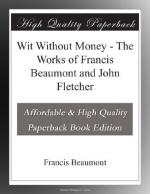|
This section contains 5,169 words (approx. 18 pages at 300 words per page) |

|
SOURCE: "Beaumont and Fletcher," in Jacobean Dramatic Perspectives, The University Press of Virginia, 1972, pp. 38-51.
In the essay that follows, Kirsch examines the artificiality of the characters and situations in Beaumont and Fletcher's work.
Indebted to both [Giovanni Battista] Guarini and [Ben] Jonson, the theatrical style which Beaumont and Fletcher and their collaborators created at once encompasses and dilutes the polarities of romance and satire. Fletcher's actual definition of tragicomedy reads very much like Guarini's, from which it was clearly borrowed. "A tragie-comedie," he wrote in the preface to The Faithful Shepherdess (1608), "is not so called in respect of mirth and killing, but in respect it wants deaths, which is inough to make it no tragedie, yet brings some neere it, which is inough to make it no comedie: which must be a representation of familiar people, with such kinde of trouble as no life be questioned; so...
|
This section contains 5,169 words (approx. 18 pages at 300 words per page) |

|


